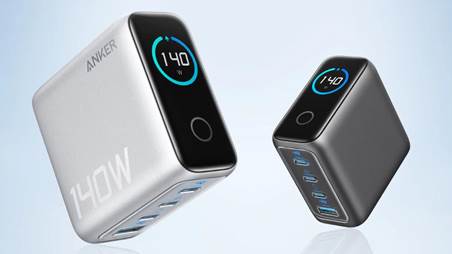Laptop chargers may seem identical, but using the
incorrect one might cause major difficulties. Each laptop has its own power
requirements, which must correspond to the output of the charger. A charger
that does not meet these specifications may impair performance, overheat, or
possibly destroy the battery. Many people believe that any charger with the
same plug form would work; however, this isn't necessarily true. To keep your
laptop safe and functioning smoothly, you must understand how compatibility works.
This tutorial outlines the dangers of using the incorrect charger and how to
select the best one for your smartphone.

What Happens If You Use the Wrong Charger?
Overheating and Potential Damage
When a charger delivers an inappropriate voltage or
current, your laptop may overheat. Extra heat accumulates inside the gadget,
stressing its internal components. Over time, this can harm the motherboard,
charging port, and power circuitry. In severe circumstances, overheating might
cause your laptop to shut down abruptly or fail to boot. The improper charger
may also make your system work harder to control power, lowering efficiency and
performance. Preventing this danger begins with using a charger that meets the
manufacturer's standards, which ensures safe operation and protects your laptop
from unnecessary wear or permanent damage.
Battery Health and Longevity Concerns
The battery is one of the most sensitive components
of a laptop, and using an improper charger might limit its life. If the charger
provides too much power, the battery may deteriorate faster due to frequent
overheating. If it supplies too little, the battery never fully charges and
struggles to keep a healthy cycle. Both scenarios degrade battery capacity and
longevity. You may experience faster drain, fewer charging cycles, or
unexpected shutdowns during usage. A suitable charger guarantees that the battery
charges at the appropriate pace, preserving efficiency and allowing you to get
the most out of your laptop's battery.
Safety Hazards and Device Failures
Using an unsuitable charger doesn't simply hinder
performance—it might present safety issues. Low-quality or mismatched chargers
sometimes lack appropriate precautions against overvoltage or short circuits.
This raises the risk of sparks, electric shocks, and even flames. Faulty
chargers may potentially harm internal components, leaving your laptop unable
to power on. Some customers claim sporadic system failures or burned
connections caused by poor or bogus adapters. To minimize these hazards, always
use chargers with safety certifications and specs that match your laptop. Doing
so assures safe charging and prevents malfunctions that might lead to costly
repairs or data loss.
How to Ensure Charger Compatibility with Your Laptop?
Check Laptop Manufacturer's Recommendations
The best approach to discover the correct charger
is to follow your laptop's manufacturer's instructions. Most manufacturers
include the right voltage, current, and wattage in their user manuals or on
their official website. You may also look at the original charger label for
information. Using the manufacturer's precise specs assures compatibility while
eliminating guessing. Original chargers may be more expensive, but they provide
proven performance and safety. If you need a replacement, check for authorized
retailers or brand-approved alternatives. Following these rules reduces
mistakes and protects your device from the hazards associated with incompatible
chargers.

Importance of Matching Charger Wattage
Wattage controls how much electricity your laptop
receives, and matching it is crucial for reliable charging. If the charger has
a lesser wattage than needed, your laptop may charge slowly or even lose power
while in use. On the other hand, utilizing a higher-wattage charger is
typically safe since the laptop will only draw what it requires. Underpowered
chargers pose a risk since they put both the device and the adapter under
stress. Before purchasing a replacement, always double-check the wattage written
on your laptop or the original charger. Correct wattage ensures that your
system runs smoothly and without power disruptions.
Understanding Connector and Plug Compatibility
Even with the proper voltage and wattage, the
connection and plug must match your laptop. Different brands utilize different
connection sizes, and using the wrong plug might harm the port. Not all USB-C
chargers give the same amount of power to laptops. Some may only support phones
or tablets, not laptops. That's why checking for USB-C Power
Delivery support is essential when buying a laptop charger type c. Always compare
the shape, size, and design of the connector with your original charger.
Ensuring a proper fit guarantees steady charging, prevents loose connections,
and avoids potential damage to both the charger and your laptop's charging
port.
Conclusion
You cannot simply use any charger for your laptop
without risking damage or safety concerns. The improper charger might lead to
overheating, battery deterioration, or even irreversible failure. To guarantee
compatibility, always adhere to the manufacturer's standards, match wattage
accurately, and verify connection type. While original chargers are the most
secure alternative, high-quality certified replacements may also function,
provided they fulfill the precise specifications. Avoid low-quality or counterfeit
chargers, which frequently lack adequate safety safeguards. A proper charger
safeguards your laptop's performance, battery life, and safety. Choosing
properly today prevents costly problems and extends the life of your laptop.
